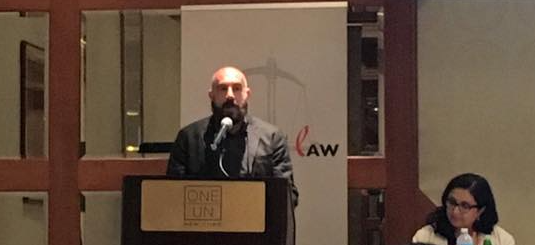
Today, at a side meeting convened the United Nations Development Programme (UNDP) during the High-Level Political Forum, HIV Justice Network’s Global Co-ordinator, Edwin J Bernard, delivered the following remarks.
Despite the incredible advances in the science of HIV treatment and prevention, and despite the roadmap created by the prescient and powerful recommendations of the Global Commission on HIV and the Law, too many people who could benefit from these scientific advances are being left behind.
As someone who acquired HIV in 1983 and survived to benefit from treatment, it pains me greatly to know that people are still suffering – dying – unnecessarily due to legal and policy barriers.
There’s no greater manifestation of the stigma of HIV, or of being associated with HIV, than the multitude of bad laws and policies on the books in almost every country in the world that punish people for not conforming to societal or cultural or the dominant religious norms: people living with HIV and other key populations most impacted by HIV.
These laws send people underground, away from services that could offer them dignity, save their lives, and improve the public health – and purse. HIV prevention and treatment are cost-saving in the long-term: healthy, productive and happy lives make communities, societies and countries rich.
But when healthcare workers are – or are perceived to be – de facto agents of the state, they are unable to deliver healthcare to those that really need it. That is what bad laws do.
Removing these legal barriers is the most cost-effective intervention any state can do – to ensure they leave no-one behind. No law reform is too difficult to tackle, no supportive law is too politically sensitive when the lives of people – and the health, dignity and wealth of a nation – are at stake.
In my own work, to see an end to unjust laws and prosecutions aimed at people living with HIV based solely on our HIV-positive status, it is frustrating and heart-breaking to see my brothers and sisters still being prosecuted and convicted under stigmatising, unscientific, overly-broad and counterproductive HIV-related laws that run contrary to the recommendation of the Global Commission and of UNAIDS, and ignore the latest scientific and medical evidence as well as best public health practice.
In the five years since the Global Commission’s report was published, a number of countries and jurisdictions have been moving in the right direction to remove unjust laws and, in some cases, replace them with enabling laws that offer support, not punishment; dignity not despair; a long and healthy life, not an early death.
These changes have required sustained efforts from civil society, including by networks of people living with HIV or other key populations, who have reached out to the judiciary, or parliamentarians, or police, and worked with them to help them understand how and why a punitive approach towards people with HIV, or those communities disproportionately impacted by HIV, does more harm than good.
In my experience, very little gets done without civil society participation. Whilst we might be perceived as ‘thorns in your side’ or worse by some governments, like Jiminy Cricket we are your conscience, and we will persist despite the shrinking spaces for us due to the changing donor landscape / or underfunding / or laws that prevent us from receiving funds or doing our work.
Because we know we are on the right side of history.
So how do we move forward?
Once enlightened – once you have read and understood that the recommendation of the Global Commission on HIV and the Law – it is clear what needs to be done: remove the laws that create the barriers.
So I am heartened when partnerships form between civil society, scientists, human rights defenders and those in parliament or government. And thank you to UNDP and to UNAIDS for your leadership on this issue. Long may it continue! And thank you to all of you working in the UN system for your support; please remember it is your role to be a broker – to facilitate partnerships between civil society and government. Please keep doing this crucial work.
Member states: please listen to the communities most impacted by HIV. We know how to reach those who are left behind. But we can’t do it when bad laws stand in our way, and we can’t help you change those laws without funding and spaces to meet and work.
Finally, my own organisation the HIV Justice Network – and the HIV JUSTICE WORLDWIDE movement to end unjust HIV criminalisation – has only really flourished since we received funding last year from the Robert Carr civil society Network Fund, a unique multilateral funding mechanism that allows global and regional networks of people living with, and most impacted by HIV, to do the work that no-one else wants to – or indeed, can do. Please ask your government to support and replenish the fund.